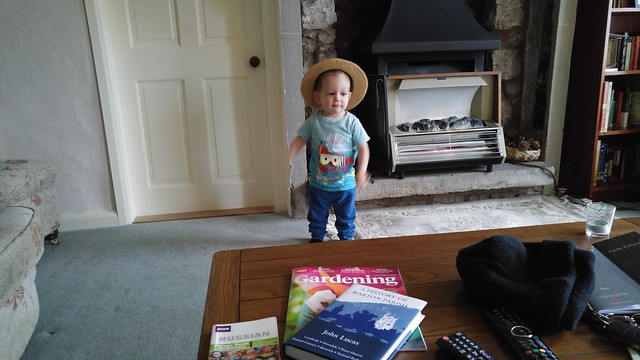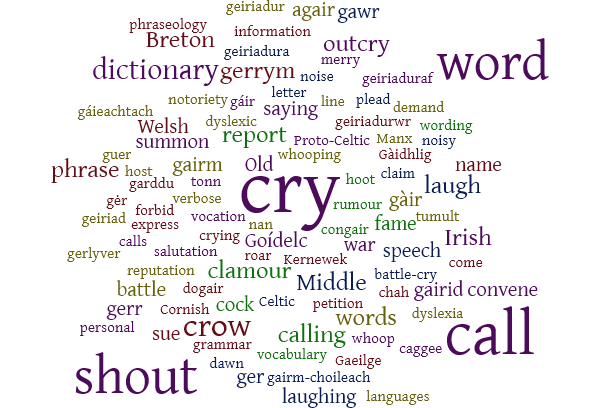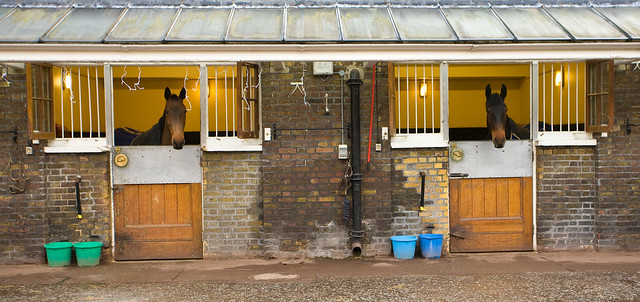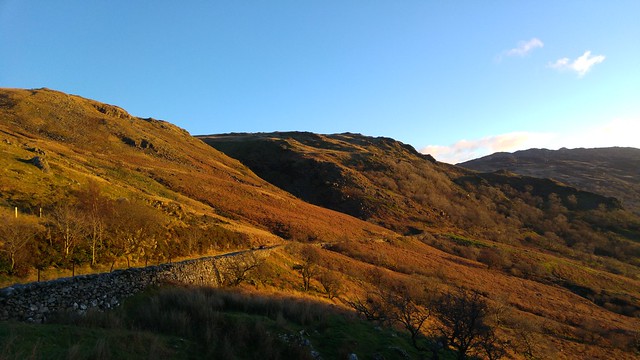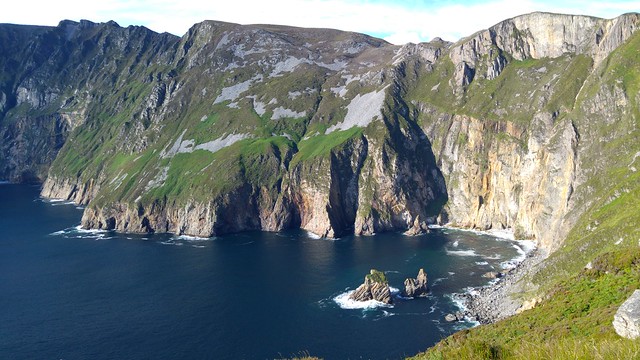Today we’re looking at the words for door, gate, port, harbour and related things in Celtic languages.
Words marked with a * are reconstructions.
| Proto-Celtic | *dwār = door |
|---|---|
| Gaulish | *durom = door – was borrowed into Latin and appeared in placenames such as Augustodurum (now Bayeux), and Nemetodurum (now Nanterre) |
| Proto-Brythonic | *dor = door |
| Old Welsh | dor = door |
| Middle Welsh (Kymraec) | dor = door |
| Welsh (Cymraeg) | dôr [druːs] = door; defence, refuge, shield; opportunity; protector, defender, chief, leader dôr blyg(edig) = folding door dôr ddyrchafad = portcullis |
| Middle Breton | dor = door |
| Breton (Brezhoneg) | dor [doːr] = door dor-dal = front door, portal dorlec’h = door frame dor a-dreñv = rear door dor a-raok = front door dor emgefre = automatic door dor greñvaet = fortified gate dor harz tan = fire door dor-borzh = gate (of a courtyard) dor brenestr = French window gwir treuz-dor = doorstep |
Etymology from the Proto-Indo-European *dʰwṓr (door), from *dʰwer- (doorway, door, gate) [source].
Words from the sane Proto-Indo-European root include: door and forum in English, deur (door) in Dutch, Tür (door, doorway) in German, dehors (outside) in French, fuori (outside) in Italian, and fuera (outside) in Spanish [source].
| Proto-Celtic | *dworestus = door |
|---|---|
| Old Irish (Goídelc) | dorus [ˈdorus] = door |
| Middle Irish (Gaoidhealg) | dorus [ˈdorus] = door |
| Irish (Gaeilge) | doras [ˈd̪ˠɔɾˠəsˠ] = door, doorway doras isteach = entrance doras amach = exit doras tosaigh / béil = front door doras cúil / thiar = backdoor doirseach = having doors, open, accessible, gaping (wound) doirseoir = door-keeper, (hall) porter doirseoireacht = occupation of door-keeper |
| Scottish Gaelic (Gàidhlig) | dorus [dɔrəs] = door, valve dorus-beag = back door, inner door dorus-mór = front door, main entrance doras a-mach = exit àrd-doras = lintel ath-dhoras = next door deoch an dorais = stirrup cup, one for the door/road, Jock and Doris |
| Manx (Gaelg) | dorrys = door, doorway, gate, portal; back (of cart), fly (of tent) dorrys doont = back door dorrys toshee = front door dorrys egin = emergency exit, exit jough yn dorrys = parting drink, stirrup cup sole y dorrys = doorstep, threshold |
| Proto-Brythonic | *drus = doorway, entrance, door |
| Old Welsh | drus = doorway, entrance, door |
| Middle Welsh (Kymraec) | drus, drvs, drws = doorway, entrance, door |
| Welsh (Cymraeg) | drws [druːs] = doorway, entrance, door, pass, estuary, opening, opportunity, facility drws codi/cudd = trap-door drws nesaf = next door (to), very near (to), bordering (on) wrth y drws = at hand, close, near o ddrws = from before drysaf, drwsaf, dryo, drwso = to mind a door (in a coal-mine) dryswr, drwswr = door-boy (in a coal-mine) drysor = doorkeepr, janitor, porter |
| Middle Cornish | daras, darat = door darador = doorkeeper |
| Cornish (Kernewek) | daras = door darasik = wicket penn/pedn daras = lintel |
Etymology from the Proto-Celtic *dwār (door) – see above [source].
| Old Irish (Goídelc) | port [por͈t] = place, shore, bank |
|---|---|
| Middle Irish (Gaoidhealg) | port = place, spot, locality, stead, abode, settlement, bank, shore, mound, entrenchment |
| Irish (Gaeilge) | port [ˈd̪ˠɔɾˠəsˠ] = landing-place, harbour, port, bank, place of refuge, haven, resort, fortified place, stronghold aerfort = airport calafort = port, harbour |
| Scottish Gaelic (Gàidhlig) | port [pɔr̪ˠʃd] = port, dock port-adhair = airport baile-puirt = seaside village, port town long-phort = seaport |
| Manx (Gaelg) | purt = harbour, port, station purt aer = airport purt awiney = river port purt lhuingey, lhong-phurt = seaport |
| Middle Welsh (Kymraec) | porth = port, harbour, haven porthua, porthfa = harbour, port, coast, haven, refuge |
| Welsh (Cymraeg) | porth [pɔrθ] = port, harbour, haven, estuary, landing-place, ferry porthfa = harbour, port, coast, haven, refuge porthfad = ferryboat, wherry porthladd = harbour, port, coast, safe anchorage porthwas = ferryman, boatman, porter, carrier |
| Middle Cornish | porth = (sea) port, harbour, bay |
| Cornish (Kernewek) | porth = cove, harbour, haven, port porth klos = docks porthva = wharf |
| Middle Breton | porz = port porz mor, portz mor = seaport |
| Breton (Brezhoneg) | porzh [pors] = port porzh-mor [pɔrzˈmoːr] = seaport |
Etymology from Latin portus (harbour, port, haven, refuge, warehouse), from Proto-Italic *portus (harbour) the Proto-Indo-European *pértus (crossing, from *per- (to lead, cross over, pass) [source].
Words from the same roots include port, portal, porter and portico in English, porte (door, gate, means) in French, puerta (door, gate, goal) in Spanish, póirse (porch, lobby, passage, closet) in Irish, and furta (wicket gate, port) in Polish [source].
| Proto-Brythonic | *porθ = door, gate, gateway *porθọr = porter, gatekeeper |
|---|---|
| Middle Welsh (Kymraec) | porth, pyrth, pirth = portal, door, gate(way) porthavr, porthaur, porthawr, porthor = porter, gatekeeper, doorkeeper |
| Welsh (Cymraeg) | porth [pɔrθ] = portal, door, gate(way), porch, lobby, vestibule, portico, gap, pass porthfa = entrance, gate, portico porthor(es) = porter, gatekeeper, doorkeeper |
| Middle Cornish | porth = door, gate, entrance porther, porthawr, portheres = doorkeeper, porter, janitor |
| Cornish (Kernewek) | porth = portico, gate porther, porthores = porter, janitor porthji = gatehouse, lodge |
| Middle Breton | porz = (monumental / city) gate |
| Breton (Brezhoneg) | porzh [pors] = (monumental) gate, courtyard porzhad = courtyard porzhier = doorman, concierge porzhierezh = courtyard, concierge porzh-gwint [pɔrzˈɡɥĩnt] = drawbridge |
Etymology from Latin porta (gate, entrance, passage, door, way), from Proto-Italic *portā (gate) the Proto-Indo-European *porteh₂, from *per- (to lead, cross over, pass) [source].
| Old Irish (Goídelc) | calad [por͈t] = shore, port, landing |
|---|---|
| Middle Irish (Gaoidhealg) | calad, caladh = shore, port, landing-place, land |
| Irish (Gaeilge) | caladh [ˈkɑl̪ˠə / ˈkalˠuː] = landing-place, ferry, port, harbour, river-meadow, break, large wave calafort = port, harbour |
| Scottish Gaelic (Gàidhlig) | cala [kal̪ˠə] = harbour, port, haven cala-phort = harbour, haven |
| Manx (Gaelg) | callee = landing place calloo = breakwater, bulwark, column, landing stage calloo marrey = pier |
Etymology possibly from Late Latin calātum from Latin calō (to call, announce solemnly) [source], or from Proto-Celtic *kaletos (hard, strong cruel) [more details].
Sources: Wiktionary, Am Faclair Beag, Online Manx Dictionary, Teanglann.ie, eDIL – Electronic Dictionary of the Irish Language, In Dúil Bélrai English – Old Irish glossary, An Etymological Dictionary of the Gaelic Language, Geiriadur Prifysgol Cymru, Gerlyver Kernewek, Dictionaire Favereau, TermOfis, English – ProtoCeltic WordList (PDF), Etymological Dictionary Of Proto Celtic



